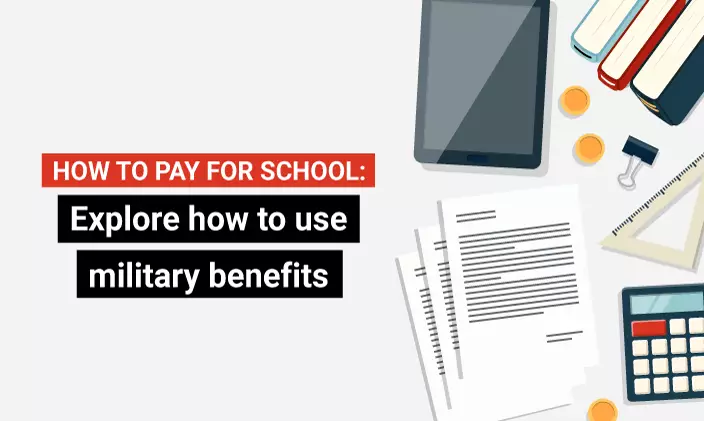What is the Post-9/11 GI Bill?

Written by Elizabeth Exline

The facts about the Post-9/11 GI Bill
One commonly cited benefit of serving in the military is the notion that the government will “pay for college.” To some extent, this is true. But why? How? And what exactly is involved? Let’s take a look!
The history of the GI Bill
The first GI Bill was passed in 1944 based on the estimate that some 16 million service members would be unemployed after World War II. Concern arose that so many people looking for a job at once would flood the market and cause another economic depression. The solution? The GI Bill, which provided job counseling, employment services and tuition assistance (among other benefits) for honorably discharged veterans.
The GI Bill expired in 1956, and not much happened with it until 1984. That’s when Mississippi Representative Gillespie Montgomery introduced legislation to extend veteran benefits during peacetime. This became known as the Montgomery GI Bill, and it still helps pay for education and training programs for eligible candidates, although it will expire in 2030. (One requirement is that service members have spent at least two years on active duty.)
A GI Bill for today
In 2008, the Post-9/11 Veterans Educational Assistance Act, or Post-9/11 GI Bill, was signed into law. It expanded benefits for military service members who served on active duty after September 10, 2001.
The bill also created the Yellow Ribbon Program, which helps fund higher education for qualifying service members at out-of-state institutions, private schools, foreign schools and graduate schools by covering fees and tuition that the Post-9/11 GI Bill doesn’t pay for.
The Post-9/11 Bill had a deadline built into it: Veterans had 15 years to either use their benefits or transfer them to their dependents. In 2017, that timeline was eliminated as part of the Harry W. Colmery Veterans Educational Assistance Act, or the Forever GI Bill.
Each bill offered or offers qualified service members and veterans a path forward to higher education. And that can be life changing for some. As Eric Ryan, senior director of military operations at University of Phoenix, notes: “Education can be the difference-maker for a veteran looking to transition into a meaningful and rewarding career after service. I personally feel very fortunate to have had the opportunity to use my GI Bill benefits to earn a bachelor’s degree after completing my military service. It was instrumental in achieving the success that I have found in my career.”
Who is the post-9/11 GI Bill for?
To be eligible for the Post-9/11 GI Bill, you must:
- Have served at least 90 days on active duty on or after Sept. 11, 2001
- Have received a Purple Heart on or after Sept. 11, 2001 and have been honorably discharged
- Have served for at least 30 consecutive days (meaning there was no break in those 30 days) on or after Sept. 11, 2001, and have been honorably discharged with a service-connected disability
- Be a dependent child using benefits transferred by a qualifying service member or veteran
Some service members and veterans are eligible for the full education benefit of the Post-9/11 GI Bill while others may receive a percentage. The deciding factor? How long you’ve been in service after 9/11.
Those who have served on active duty for at least 36 months, who served on active duty and received a Purple Heart on or after Sept. 11, 2001, or who were discharged because of a service-connected disability after 30 or more days of continuous service are all eligible for 100% of Post-9/11 GI Bill benefits.
What's included in the Post-9/11 GI Bill education benefits?
The Post-9/11 GI Bill offers the kind of assistance that can make a difference for adults considering higher education. Education benefits, including the full cost of public school, in-state tuition, is covered by the bill, while private and foreign school tuition is covered up to a certain limit. (Rates are updated each year.)
Additional funding is provided for:
- A monthly housing allowance or housing stipend
- Books stipend
- Relocation expenses (for rural students who need to move to attend school)
The Post-9/11 GI Bill can be applied to other endeavors as well. Vocational training, apprenticeships, flight training, test fees, entrepreneurship training and other options are available to qualifying veterans and service members.
The fine print
While the Forever GI Bill eliminated the 15-year deadline previously included in the Post-9/11 GI Bill, it only applies to veterans whose service ended on or after Jan. 1, 2013. For those whose last discharge predates 2013, the use-it-or-lose-it provision applies.
Qualifying service members may also elect to transfer all or some of their Post-9/11 GI Bill benefits to a spouse or dependents. Some higher education institutions, such as University of Phoenix, also offer military rates to service members and their spouses.
The Post-9/11 GI Bill and the Forever GI Bill offer compelling incentives for military service members and veterans to pursue higher education as they transition into civilian life. While the details can become specific, especially about service in the Reserves, the payoff can be well worth the research.
For more information about benefits or the monthly housing allowance or to check eligibility, visit the U.S. Department of Veterans Affairs website.
GI Bill® is a registered trademark of the U.S. Department of Veterans Affairs (VA). More information about education benefits offered by the VA is available at the official U.S. government website at https://www.benefits.va.gov/gibill.

ABOUT THE AUTHOR
Elizabeth Exline has been telling stories ever since she won a writing contest in third grade. She's covered design and architecture, travel, lifestyle content and a host of other topics for national, regional, local and brand publications. Additionally, she's worked in content development for Marriott International and manuscript development for a variety of authors.
This article has been vetted by University of Phoenix's editorial advisory committee.
Read more about our editorial process.
Read more articles like this:


